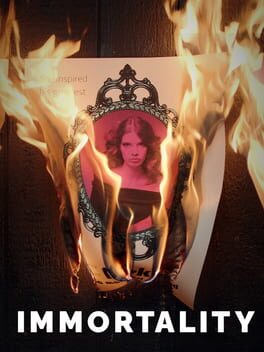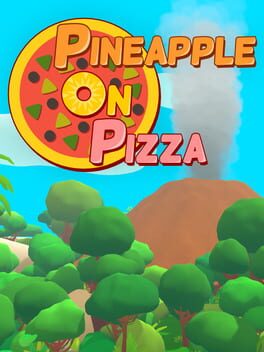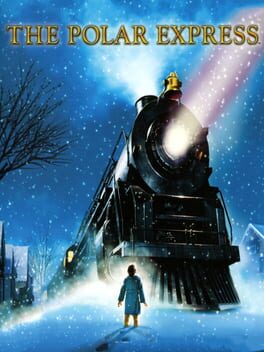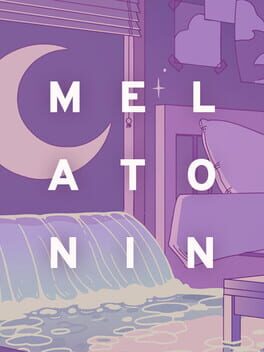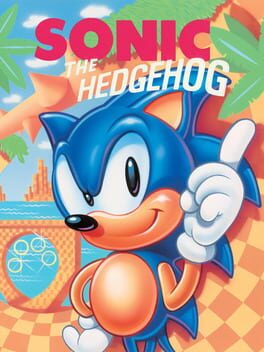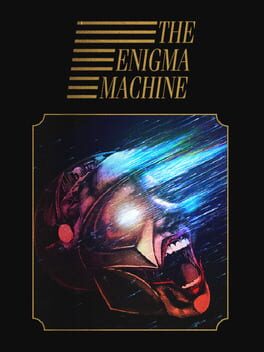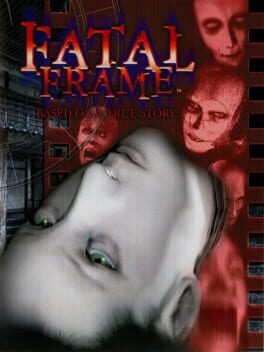Primadonnapeach
28 reviews liked by Primadonnapeach
Immortality
2022
Pineapple on Pizza
2023
The Polar Express
2004
Melatonin
2022
Sonic the Hedgehog
1991
Tunic
2022
The Enigma Machine
2018
Fatal Frame
2001
Fatal Frame is often discussed as one of the pillars of survival horror in its prime, yet it still feels lesser appreciated in contrast to its peers. That's an injustice given this first outing is every bit as thrilling and innovative as the Resis and Silent Hills - even if the storytelling and exploration can be a tad subpar at times. Fantastic atmosphere and surprisingly deep camera combat make this ridiculous fun to play. Also, it's scary! Often felt uneasy and a few scripted scares cleverly blend the fixed-camera with the viewfinder mechanic to startle players. I was worried this might feel a bit prototypical as the franchise found its feet, but this is confident out of the gate. Jumping straight onto Crimson Butterfly next.
Paradise Killer
2020
This review contains spoilers
Paradise Killer is an immediately familiar experience: every bit of it can be recognised from elsewhere. It is a collage in video game form, borrowing liberally from Grasshopper's Kill the Past series (cheekily commodified in-game as the refreshing beer "Kill the Thirst") and psychopop murder mystery DanganRonpa, stylised in pastel vaporwave aesthetics: a genre wholly dependent on duplication. Barry "Epoch" Topping's city pop/yacht jazz-inspired soundtrack immediately echoes the YouTube algorithms of those of us ruined by Mariya Takeuchi and Toshiki Kadomatsu, though it is original and sample-free.
One might see these numerous references, homages, and borrowings and accuse Paradise Killer of unoriginality, but the borrowings are the point: Paradise Killer is the Ur-hauntological adventure game, with each of its disparate parts key to its whole.
Beyond the limits of reality exists the Island Sequence: a pocket dimension ruled over by a cadre of immortal narcissists called The Syndicate. Ostensibly created as worship to the Syndicates' many eldritch Gods, it's essentially an eternal vacation home. Beachfront living and luxurious cocktails for the immortals, while the Citizens—regular humans who've been trafficked across dimensions—are forced into gruelling slave labour to keep the Islands running. It's always a temporary arrangement; every thousand or so years, the Island falls prey to demon invasion, requiring the creation of a new Island, the migration of the Syndicate, and the slaughter of the Citizens to appease the Gods' wrath.
Paradise Killer opens on Sequence 24 as it begins to wind down, as all Sequences do. Preparations are being made for Perfect 25, an idealised "Forever Island" supposedly immune to demonic influence. Just as migration begins, tragedy strikes Paradise: the High Council have been slaughtered in cold blood, throwing 24 into lockdown and disarray. Investigator Lady Love Dies, previously exiled for 8000 years after falling prey to demonic seduction, is brought out of retirement by the Syndicate's judicial body to solve the case. The player, as Lady Love Dies, scours Sequence 24 for clues, meeting the larger-than-life Syndicate members, and looking for holes to poke in their testimonies when it's time to hold court.
Sequence 24 is a dreamlike hodgepodge of spatial design: a tropical beach resort punctuated by realistic Japanese danchi-style public housing, as well as surreal pyramids, temples, and ziggurats. The landscape is bathed in different shades of neon, as modern architecture combines with Doric pillars and ancient sculpture. Any screenshot is a potential vaporwave album cover. It's also a profoundly lonely experience; each of its characters are spread far apart from each other, occupying their own luxurious "Generation Me" living quarters. Lady Love Dies wanders across the island alone, music fading in and out the closer the player is to a radio tower. What results is an empty shell of a city, a hyper-stylized monument to hedonistic ambition and hubris.
The vaporwave influence is far more than a stylistic choice: a simultaneous celebration of a mythologised recent past, and a critique of the continued failures of capitalism, Paradise Killer's style is key to its themes. It is no coincidence that vaporwave is preoccupied with 1980s Japan, the height of the bubble economy before it burst in 1991, resulting in the economic downturn of Lost Decade—which, as of 2021, has continued as The Lost 30 Years. Like a wistful snapshot of an 80s metropolis, Sequence 24 is a wonderpark; a collection of non-places. As the late cultural theorist Mark Fisher would write in his 2012 essay "What is Hauntology?", "[non-places'] resemble one another more than they resemble the particular spaces in which they are located, and [their] ominous proliferation is the most visible sign of the implacable spread of capitalist globalization. The disappearance of space goes alongside the disappearance of time: there are non-times as well as non-places." Paradise Killer, similarly, is wholly unstuck from time: the Syndicate have successfully dragged out their late 20th century summer vacation for thousands of years, but it is not enough: perfection must be endless.
Echoing any economic bubble, every Island Sequence has been a profound failure, setting up Perfect 25 to be a fiction within the game's own fiction. The Syndicate gaze foolishly to a past that never existed, believing they're looking to a bright future. Paradise's late capitalism has lasted thousands of years, and it's set to continue brutally and unabated—always somebody else's fault, the self-absorbed death drive of the Syndicate will march on.
Paradise Killer is a visually enticing adventure; the surface-level beauty of Sequence 24 eroded with each new allusion to the utter bleakness that is the prerequisite to its existence. A world of multicoloured plastic shit, the vacation spot that's a “““nice place””” but you wouldn't want to live there—unfortunately, thanks to neoliberalism, we already do.
Hey, at least you can pick your favourite product.
One might see these numerous references, homages, and borrowings and accuse Paradise Killer of unoriginality, but the borrowings are the point: Paradise Killer is the Ur-hauntological adventure game, with each of its disparate parts key to its whole.
Beyond the limits of reality exists the Island Sequence: a pocket dimension ruled over by a cadre of immortal narcissists called The Syndicate. Ostensibly created as worship to the Syndicates' many eldritch Gods, it's essentially an eternal vacation home. Beachfront living and luxurious cocktails for the immortals, while the Citizens—regular humans who've been trafficked across dimensions—are forced into gruelling slave labour to keep the Islands running. It's always a temporary arrangement; every thousand or so years, the Island falls prey to demon invasion, requiring the creation of a new Island, the migration of the Syndicate, and the slaughter of the Citizens to appease the Gods' wrath.
Paradise Killer opens on Sequence 24 as it begins to wind down, as all Sequences do. Preparations are being made for Perfect 25, an idealised "Forever Island" supposedly immune to demonic influence. Just as migration begins, tragedy strikes Paradise: the High Council have been slaughtered in cold blood, throwing 24 into lockdown and disarray. Investigator Lady Love Dies, previously exiled for 8000 years after falling prey to demonic seduction, is brought out of retirement by the Syndicate's judicial body to solve the case. The player, as Lady Love Dies, scours Sequence 24 for clues, meeting the larger-than-life Syndicate members, and looking for holes to poke in their testimonies when it's time to hold court.
Sequence 24 is a dreamlike hodgepodge of spatial design: a tropical beach resort punctuated by realistic Japanese danchi-style public housing, as well as surreal pyramids, temples, and ziggurats. The landscape is bathed in different shades of neon, as modern architecture combines with Doric pillars and ancient sculpture. Any screenshot is a potential vaporwave album cover. It's also a profoundly lonely experience; each of its characters are spread far apart from each other, occupying their own luxurious "Generation Me" living quarters. Lady Love Dies wanders across the island alone, music fading in and out the closer the player is to a radio tower. What results is an empty shell of a city, a hyper-stylized monument to hedonistic ambition and hubris.
The vaporwave influence is far more than a stylistic choice: a simultaneous celebration of a mythologised recent past, and a critique of the continued failures of capitalism, Paradise Killer's style is key to its themes. It is no coincidence that vaporwave is preoccupied with 1980s Japan, the height of the bubble economy before it burst in 1991, resulting in the economic downturn of Lost Decade—which, as of 2021, has continued as The Lost 30 Years. Like a wistful snapshot of an 80s metropolis, Sequence 24 is a wonderpark; a collection of non-places. As the late cultural theorist Mark Fisher would write in his 2012 essay "What is Hauntology?", "[non-places'] resemble one another more than they resemble the particular spaces in which they are located, and [their] ominous proliferation is the most visible sign of the implacable spread of capitalist globalization. The disappearance of space goes alongside the disappearance of time: there are non-times as well as non-places." Paradise Killer, similarly, is wholly unstuck from time: the Syndicate have successfully dragged out their late 20th century summer vacation for thousands of years, but it is not enough: perfection must be endless.
Echoing any economic bubble, every Island Sequence has been a profound failure, setting up Perfect 25 to be a fiction within the game's own fiction. The Syndicate gaze foolishly to a past that never existed, believing they're looking to a bright future. Paradise's late capitalism has lasted thousands of years, and it's set to continue brutally and unabated—always somebody else's fault, the self-absorbed death drive of the Syndicate will march on.
Paradise Killer is a visually enticing adventure; the surface-level beauty of Sequence 24 eroded with each new allusion to the utter bleakness that is the prerequisite to its existence. A world of multicoloured plastic shit, the vacation spot that's a “““nice place””” but you wouldn't want to live there—unfortunately, thanks to neoliberalism, we already do.
Hey, at least you can pick your favourite product.
Paradise Killer
2020
The open ended approach to the story in combination with an appeal directly to the intrinsic motivation of the player to find the truth and not just start the trial, convict some people and fuck off, is what kept me going for the 9 or so hours it took me to beat Paradise Killer.
The world is beautiful, vast but becomes familiar after a short period of time. It involves quite a lot of backtracking to push the investigation forward and follow the leads, which CAN end up with the player bouncing between to characters to advance their dialogue, but doesn't have to.
Paradise Killer will never play the same for 2 people, as the order in which you uncover the mysteries can heavily vary.
The game and it's environments are incredibly dense and gorgeous, accompanied by banger soundtrack exploring the island feels great.
I really like Paradise Killer. My only gripe with the game is that menus and interfaces can feel a little slow with frequent usage.
The world is beautiful, vast but becomes familiar after a short period of time. It involves quite a lot of backtracking to push the investigation forward and follow the leads, which CAN end up with the player bouncing between to characters to advance their dialogue, but doesn't have to.
Paradise Killer will never play the same for 2 people, as the order in which you uncover the mysteries can heavily vary.
The game and it's environments are incredibly dense and gorgeous, accompanied by banger soundtrack exploring the island feels great.
I really like Paradise Killer. My only gripe with the game is that menus and interfaces can feel a little slow with frequent usage.
